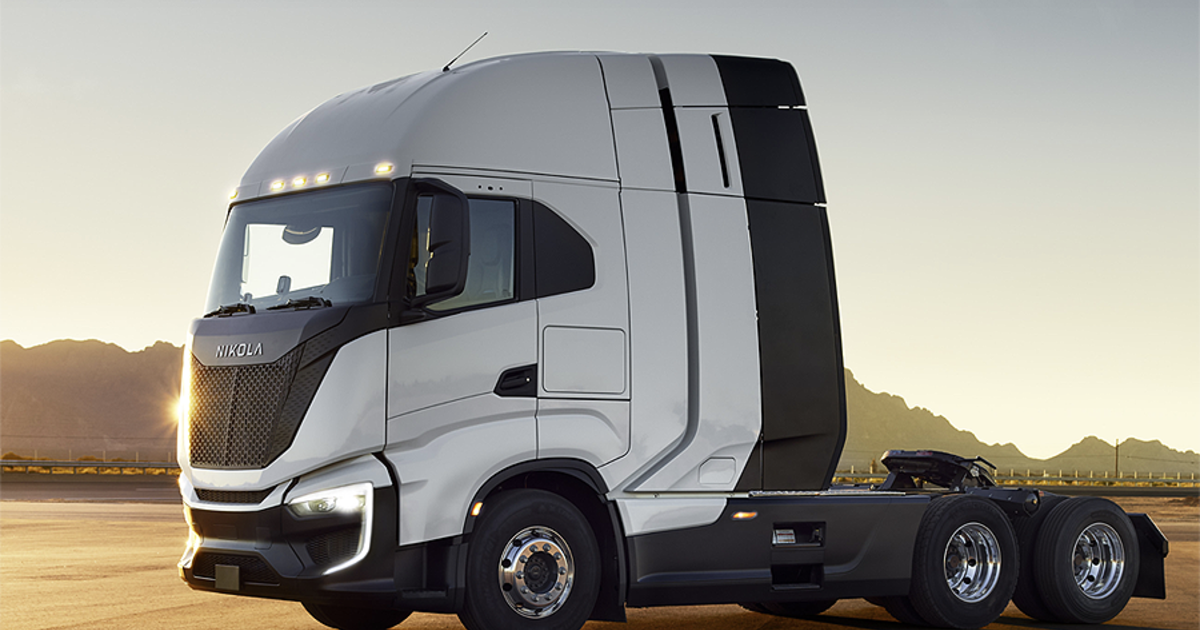
After booting out a CEO convicted of fraud, launching an electric heavy-duty truck and getting ready to start the first delivery of its flagship hydrogen fuel cell big rig, Nikola Corp. is looking to the next phase of its turnaround.
The company’s success is pinned on the fuel cell truck and its efforts to create depots where customers can get clean hydrogen to run the zero-emission vehicles.
“I think that’s very important because if you just have a world-class truck, a best-in-class truck, as we have, customers quite rightly will say, ‘Well, we’re out of hydrogen,’ ” Michael Lohscheller, Nikola’s CEO, told Automotive News. “What we want to do from the Nikola side is really offer the truck and the energy.”
The success of these ventures will be key for Nikola to become a serious competitor in the truck space, contribute to solving one of transportation’s most confounding issues and build up its reputation as a transformative company with technology that is decidedly not too good to be true.
Antti Lindström, an analyst at S&P Global Mobility, said the company’s commitment to delivering hydrogen trucks by the end of the year in North America is “telling of how important they think that that vehicle or that technology is for their credibility and market survival.”
Nikola also needs to deliver on hydrogen to meet its cash needs. In March, it announced a secondary stock sale that garnered little interest on Wall Street – the company’s underwriter was initially able to place only a third of the shares, and an unnamed private investor bought the remainder directly from Nikola.
The company reports its first-quarter results on May 9, but it logged a net loss of $784.2 million on revenues of $50.8 million in 2022, leaving it with cash and cash equivalents of about $323 million.
Nikola is still working to shed the baggage of its former CEO Trevor Milton, who was convicted of securities fraud after unveiling what turned out to be a fake hydrogen-powered truck. The publicity stunt almost derailed the business and contributed to a $125 million settlement of fraud charges with the Securities and Exchange Commission.
Lohscheller’s task now is to resolve the company’s unstable financial situation by making sure it has enough capital to pursue its strategy to become a provider of hydrogen trucks and fuel and to offer electric trucks for customers pursuing different avenues for reducing carbon emissions. Lohscheller said that Nikola has access to capital.
“We have to focus on what really matters, and that is absolutely for us, the energy business, but in particular also with hydrogen, the fuel cell truck,” he said. “That’s where the focus is.”
Lohscheller said that Nikola plans to produce the hydrogen trucks in the third quarter of the year and will deliver up to 150 of them in 2023. In 2024, he said, Nikola will have “full capacity for both” battery-electric and hydrogen-powered trucks.
AJR Trucking, which carries mail for the United States Postal Service and moves freight in and out of the ports of Los Angeles and Long Beach, has purchased 50 hydrogen fuel trucks. Alberta Motor Transport Association in Canada has bought one, and GP Joule, a German green energy system provider, announced a letter of intent to order 100 of them in January.
Other manufacturers are right behind Nikola. Toyota says it will begin to assemble its hydrogen fuel cell modules in 2023, and at the ACT Expo in Anaheim, Calif., this week, the automaker said that Paccar’s Kenworth and Peterbilt brands will put the powertrain in their Class 8 trucks.
Hyundai also revealed a U.S. version of its Xcient Class 8 fuel cell tractor that will begin operations for customers in Northern California this year.
Nikola’s hydrogen plans include partnering with Voltera, an EV charging infrastructure company, to develop up to 50 hydrogen stations in North America in the next five years.
Voltera will site, build, own and operate the refueling stations, while Nikola will supply the hydrogen fuel through its hydrogen production brand, HYLA.
“We will make sure that hydrogen is available for our future truck customers,” said Lohscheller. “We want to bring the chicken and the egg together.”
The company said in a 2022 SEC filing that executives “believe the key differentiator of our business model is our planned hydrogen fueling ecosystem,” and acknowledged that “our plan to build a network of hydrogen fueling stations will require significant cash investments and management resources and may not meet our expectations with respect to additional sales” of hydrogen vehicles.
If Nikola stays on schedule, its hydrogen truck and power stations will meet a pressing need. Batteries either have a prohibitively limited range or too much weight to power long-haul, heavy-duty trucks. Lengthy charging times, too, make them an incomplete solution.
Hydrogen fuel cell trucks are lighter, leaving more room for payload. They also look to have more range and require shorter fueling time – if the infrastructure is available.
“We want to use this time” to “make sure that we are very well-positioned,” Lohscheller said. “Speed is important.”
Nikola’s race – against its competitors and against the cash burn – is on.

